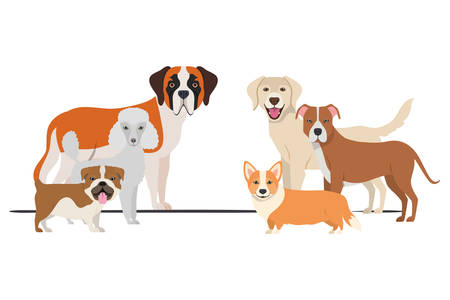Understanding Your Lifestyle and Expectations
Before you even begin browsing lists of popular dog breeds in the UK, it’s crucial to take a step back and reflect on your own lifestyle and what you truly expect from a canine companion. Choosing a dog isn’t just about falling for a pair of soulful eyes or picking the breed that’s trending on social media – it’s about making sure you’re ready for the long-term commitment that comes with responsible pet ownership.
Assessing Your Daily Routine
Start by taking an honest look at your typical day. Are you out of the house from dawn till dusk, or do you work from home? Dogs, especially young ones, need regular company, mental stimulation, and physical exercise. Some breeds are content to lounge around while others, like Collies or Spaniels, thrive on constant activity. Matching your routine to a breed’s needs will set both of you up for success.
Energy Levels: Yours vs. Theirs
If you’re someone who enjoys long walks across the British countryside or exploring city parks, an active breed might be right up your alley. But if your idea of a perfect evening is curling up with a cuppa and a good telly programme, consider dogs that are more laid-back and low-maintenance. Remember, mismatched energy levels can lead to frustration – for both human and hound!
Living Arrangements Matter
Whether you’re settled in a cosy London flat or enjoying rural life in Yorkshire, your living space should play a big part in your decision. Larger breeds may struggle in smaller spaces without access to a garden, while some small breeds are surprisingly noisy or energetic. Think about noise sensitivity too – terraced housing means you’ll want a dog less likely to bark at every postie or passing fox.
The Long-Term Commitment
Finally, remember that bringing home a dog is not just for Christmas – it’s often a decade-long adventure. Vet bills, grooming needs, holidays (will you need kennels?), and changes in family circumstances all need consideration. Taking time now to weigh these factors will help ensure you choose a breed that fits seamlessly into your UK home and lifestyle for years to come.
Popular Dog Breeds for Beginners in the UK
If you’re a first-time dog owner in the UK, choosing a breed that suits your lifestyle and experience level is key to building a successful bond with your new four-legged companion. Some breeds stand out as favourites among beginners due to their temperament, adaptability, and manageable care needs. Below are some of the most popular choices in Britain, along with reasons why they make fantastic starter pets.
| Breed | Personality Traits | Exercise Needs | Why Theyre Ideal for First-Timers |
|---|---|---|---|
| Labrador Retriever | Friendly, eager to please, intelligent | High (enjoys long walks, games of fetch) | Easy to train, sociable with families and children, well-mannered in public spaces |
| Cocker Spaniel | Affectionate, cheerful, adaptable | Moderate (loves playtime and country rambles) | Compact size for British homes, excellent companions, generally good health |
| Border Terrier | Loyal, spirited, hardy | Moderate (appreciates both countryside and city walks) | Low-maintenance coat, great for active singles or families, renowned for good nature |
Labrador Retriever: The Classic Family Favourite
Labradors top the charts not just in Britain but globally, thanks to their gentle nature and versatility. They thrive on companionship and are rarely aggressive. Their intelligence means they pick up training quickly—ideal if you’re new to dog ownership. Labradors require regular exercise but are just as happy lounging at your feet after a countryside walk.
Cocker Spaniel: Adaptable and Affectionate
This quintessentially British breed has charmed generations with its waggy tail and soulful eyes. Cocker Spaniels are known for being particularly affectionate and adaptable—whether you live in a city flat or rural cottage. They enjoy moderate exercise and have a cheerful disposition that helps them fit easily into family life.
Border Terrier: Small but Mighty Companion
If you prefer something smaller yet still robust enough for adventure, the Border Terrier is a beloved choice among UK owners. These dogs are tough without being overly boisterous, making them perfect for both urban environments and countryside living. Their low-maintenance coats and even temperaments mean less hassle and more enjoyment for first-timers.

3. Temperament and Compatibility
When selecting a popular dog breed as a first-time owner in the UK, it’s vital to consider temperament and how well the dog will fit into your life. Matching a breed’s typical personality traits with your own lifestyle is crucial for a harmonious relationship. For instance, if you’re an energetic person who enjoys long walks across the countryside or weekends rambling through national parks, breeds like the Labrador Retriever or Border Collie—both beloved in Britain—may be ideal due to their high energy and friendly nature.
Conversely, if your pace of life is more relaxed or you live in a flat in central London, breeds such as the Cavalier King Charles Spaniel or the French Bulldog are often recommended. These dogs tend to adapt well to smaller living spaces and have a more laid-back attitude, making them perfect companions for city dwellers.
Personality Pairing
Think about your own character: are you outgoing and active, or do you prefer quiet evenings at home? Some British favourites, like the Cocker Spaniel, love socialising and thrive in busy households, while others, such as the Whippet, appreciate calm environments and gentle affection.
Family Setup Matters
If you have children or other pets, choosing a breed known for its tolerance and gentle disposition is essential. The Golden Retriever remains a top choice among UK families for its patience and loving nature with kids. On the other hand, if you have elderly relatives at home, consider breeds that are less boisterous but equally affectionate, like the Shih Tzu.
Breed Traits Commonly Seen in the UK
Popular UK breeds each bring their quirks—Staffordshire Bull Terriers are renowned for their loyalty and resilience, but require owners who can offer consistent training and socialisation. Meanwhile, Beagles are cheerful and sturdy but need plenty of mental stimulation to prevent mischief. By evaluating how these typical characteristics align with your family dynamic and daily routine, you’ll make a more informed decision that leads to lasting companionship.
Grooming, Training, and Health Considerations
When selecting your first dog in the UK, understanding the unique grooming, training, and health needs of popular breeds is essential. Each breed comes with its own requirements, and being aware of these will make your journey as a new owner smoother and more enjoyable.
Coat Care Requirements
Some breeds shed heavily and require regular brushing, while others may need professional grooming. Below is a quick comparison of common breeds:
| Breed | Coat Type | Grooming Frequency |
|---|---|---|
| Labrador Retriever | Short, dense | Weekly brushing |
| Cavalier King Charles Spaniel | Silky, medium-length | 2-3 times/week plus occasional trims |
| Cocker Spaniel | Feathered, medium-length | Regular brushing & professional grooming |
| Staffordshire Bull Terrier | Smooth, short | Minimal – occasional brush |
Trainability of Popular Breeds
Your experience as a first-time owner can be greatly affected by how easy your chosen breed is to train. For example:
- Labradors and Cockapoos are known for their eagerness to please and adaptability in training.
- Staffies are intelligent but can be stubborn—consistent positive reinforcement works best.
- Cavaliers are gentle but may need patience with house training.
Common Health Issues and UK Vet Access
Disease risks vary between breeds. Heres an overview of typical concerns:
| Breed | Common Health Issues |
|---|---|
| Labrador Retriever | Hip dysplasia, obesity |
| Cavalier King Charles Spaniel | Heart disease (mitral valve), ear infections |
| Cocker Spaniel | Ear infections, eye problems |
The UK boasts excellent veterinary care across both cities and countryside. Registering with a local vet soon after bringing your dog home is wise; most surgeries offer puppy classes and healthcare plans. Additionally, pet insurance is highly recommended. In the UK, many policies cover accidents, illnesses, and some routine treatments—giving you peace of mind should unexpected costs arise.
5. Responsible Sourcing and Adoption in the UK
For first-time dog owners in the UK, choosing where to get your new companion is as important as selecting the right breed. Ethical sourcing not only ensures your puppy is healthy and well-adjusted but also supports animal welfare across the country. Here’s a practical guide to help you navigate responsible options, from reputable breeders to trusted rescue organisations.
Understanding Reputable UK Breeders
If you’ve decided on a specific breed, it’s vital to look for breeders who adhere to high standards of animal care. In the UK, The Kennel Club’s Assured Breeder Scheme is an excellent place to start your search. Members must meet strict criteria regarding health testing, socialisation, and living conditions. Always ask to visit the breeder’s premises, meet the puppy’s mother, and see documentation of health checks or vaccinations. A trustworthy breeder will be just as interested in your suitability as an owner as you are in their puppies.
Rescue Centres and Charities
Adopting from a rescue centre or charity can be incredibly rewarding and offers a loving home to dogs in need. Well-known organisations such as the RSPCA, Dogs Trust, and Battersea Dogs & Cats Home follow rigorous rehoming procedures designed to match each dog with the right owner. Staff will assess your lifestyle and experience before suggesting breeds or individual dogs that fit well with first-time owners—sometimes offering ongoing support post-adoption.
Key Regulations and Standards
The UK has robust regulations around pet breeding and adoption. Look for establishments that meet or exceed The Kennel Club or RSPCA standards, which include regular veterinary care, proper socialisation, and transparent practices. Avoid purchasing from online adverts or unlicensed breeders where welfare cannot be guaranteed; not only is this risky for your own experience, but it may also fuel unethical practices like puppy farming.
Final Thoughts on Responsible Choices
Whether you adopt or purchase from a breeder, taking the time to choose a reputable source helps ensure you bring home a healthy, happy dog suited to your life as a first-time owner. Plus, by supporting responsible breeders and charities, you contribute positively to dog welfare across the UK—making those future tail wags all the more meaningful.
6. First-Hand Experiences and Local Community Support
Choosing your first dog breed in the UK goes beyond research—it’s about connecting with real owners and tapping into supportive local networks. Many new dog owners find invaluable guidance by sharing stories and learning from others who’ve been in their shoes. For instance, Sophie from Manchester chose a Labrador Retriever as her first pet after chatting with neighbours at her local park. She discovered that Labs’ friendly nature made them ideal for families, but she was also warned about their high energy levels—a tip she hadn’t read online.
Joining local dog walking groups is another fantastic way to gain practical insight. These gatherings—often found in city parks or on community noticeboards—allow you to meet different breeds up close, ask questions, and observe behaviour. John, a first-time owner from Bristol, shared that his confidence soared after attending weekly walks organised by a local Facebook group. Not only did he pick up training tips, but he also found emotional support during the early (sometimes overwhelming) weeks of puppyhood.
Online communities tailored to UK dog lovers are equally beneficial. Forums like The Kennel Club’s community and region-specific Facebook groups offer round-the-clock advice, breed recommendations, and even alerts about local events or veterinary clinics. Connecting with these groups means you’re never alone—even if you face challenges unique to British weather or housing.
By leaning on the wisdom of experienced owners and participating in community activities, you’ll be better equipped to choose a breed that fits your lifestyle and feel supported throughout your journey as a first-time dog parent in the UK.


